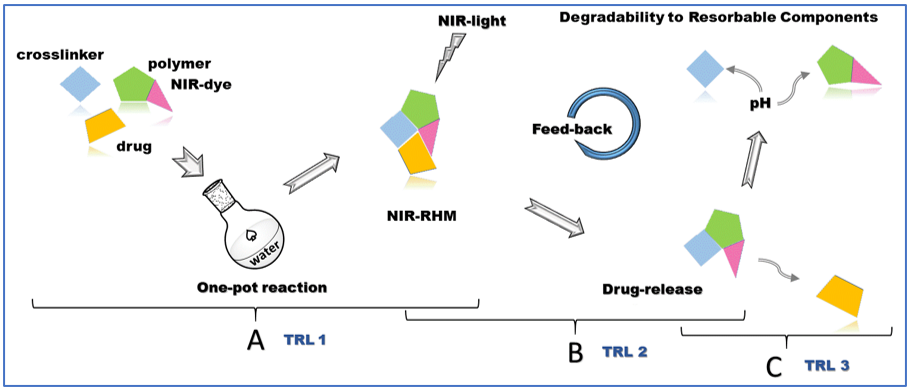OCUMATER
Near infrared-light drug-delivery materials for ocular implants
Project ID: PN-III-P1-1.1-TE-2019-0538
Project ID: PN-III-P1-1.1-TE-2019-0538
Projector leader: Florica Adriana Jerca
Project type: National Funding
Project program: Research projects to stimulate the establishment of young independent research teams – TE competition 2019
Funded by: Unit Executive for Funding Higher Education, Research, Development and Innovation
Contractor: Institute of Organic and Supramolecular Chemistry “Costin D. Nenitescu”
Start date: 01 September 2020
End date: 31 August 2022
Project abstract:
The present project aims at developing competitive near infrared-light responsive materials for on-demand drug delivery to be used as biodegradable ocular devices. Ocular implants represent up to date solutions developed to treat chronic illnesses of the eye that affect the posterior segment. The most important advantage associated with employing this drug delivery method is the long-term sustained release of drugs at the target location. However, till now there are no ocular implants approved for the on-demand release administration. Poly(2-isopropenyl-2-oxazoline) (PiPOx) is a hydrophilic and biocompatible polymer, which has emerged as a novel and versatile platform to develop advanced functional hydrogel materials, showing high potential to be used in the development of biomaterials. The key aspects that differentiate the protocol of synthesis from other competitive studies is that the polymer crosslinking reaction is clean, does not require a catalyst, and no by-products are formed. From a technological point of view the advantages are associated with the low working temperature, simple technologic process based on water-soluble interchangeable components, and target product specifications. Via the proposed objectives and activities, the multidisciplinary team of young researchers undertook the challenge to demonstrate that PiPOx light-responsive hydrogels may represent a feasible solution in the construction of advanced ocular drug-delivery systems for on-demand release. The team has wide expertise in developing hydrogel materials and light-responsive materials starting from PiPOx, and as well as for in vitro testing.

Projector leader: Florica Adriana Jerca
Project type: National Funding
Project program: Research projects to stimulate the establishment of young independent research teams – TE competition 2019
Funded by: Unit Executive for Funding Higher Education, Research, Development and Innovation
Contractor: Institute of Organic and Supramolecular Chemistry “Costin D. Nenitescu”
Start date: 01 September 2020
End date: 31 August 2022
Project abstract:
The present project aims at developing competitive near infrared-light responsive materials for on-demand drug delivery to be used as biodegradable ocular devices. Ocular implants represent up to date solutions developed to treat chronic illnesses of the eye that affect the posterior segment. The most important advantage associated with employing this drug delivery method is the long-term sustained release of drugs at the target location. However, till now there are no ocular implants approved for the on-demand release administration. Poly(2-isopropenyl-2-oxazoline) (PiPOx) is a hydrophilic and biocompatible polymer, which has emerged as a novel and versatile platform to develop advanced functional hydrogel materials, showing high potential to be used in the development of biomaterials. The key aspects that differentiate the protocol of synthesis from other competitive studies is that the polymer crosslinking reaction is clean, does not require a catalyst, and no by-products are formed. From a technological point of view the advantages are associated with the low working temperature, simple technologic process based on water-soluble interchangeable components, and target product specifications. Via the proposed objectives and activities, the multidisciplinary team of young researchers undertook the challenge to demonstrate that PiPOx light-responsive hydrogels may represent a feasible solution in the construction of advanced ocular drug-delivery systems for on-demand release. The team has wide expertise in developing hydrogel materials and light-responsive materials starting from PiPOx, and as well as for in vitro testing.
